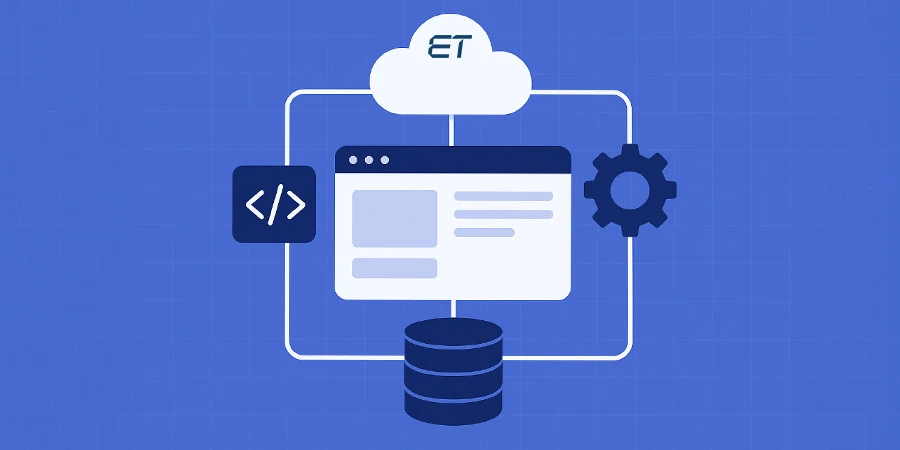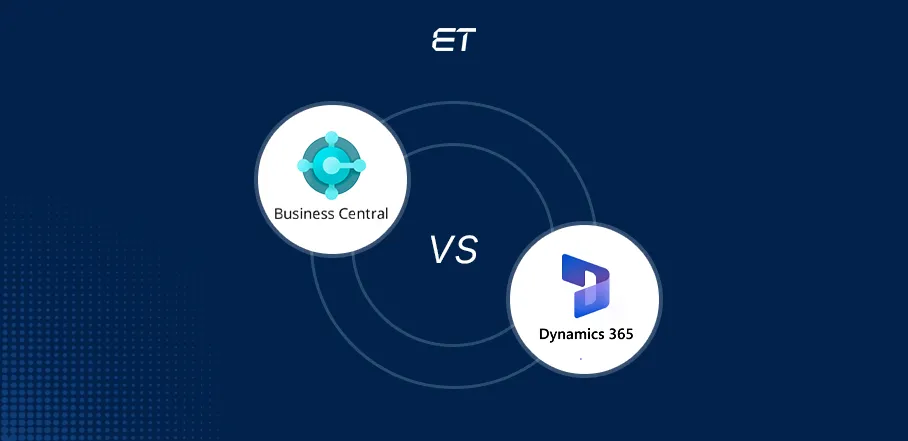
Business Central vs Dynamics 365: A Quick Breakdown for Busy CTOs
Your Microsoft Partner pitched two prominent ERP platforms, and now your CEO wants the final verdict. You Google Business Central vs Dynamics 365 to get answers, but drown in tech-heavy fluff instead.
Meanwhile, the ERP market is pushing approx. USD 56 billion this year. This number prompts you to act fast. In such a case, what do you wish?
We get it – you want a no-nonsense guide that simplifies Microsoft Business Central vs Dynamics 365. You want to know which platform makes you feel, ‘Yes, that was the right call!’
This blog delivers the same. So, let’s break it down!
Get expert guidance to pick the perfect ERP.
What is Microsoft Dynamics 365 Business Central?
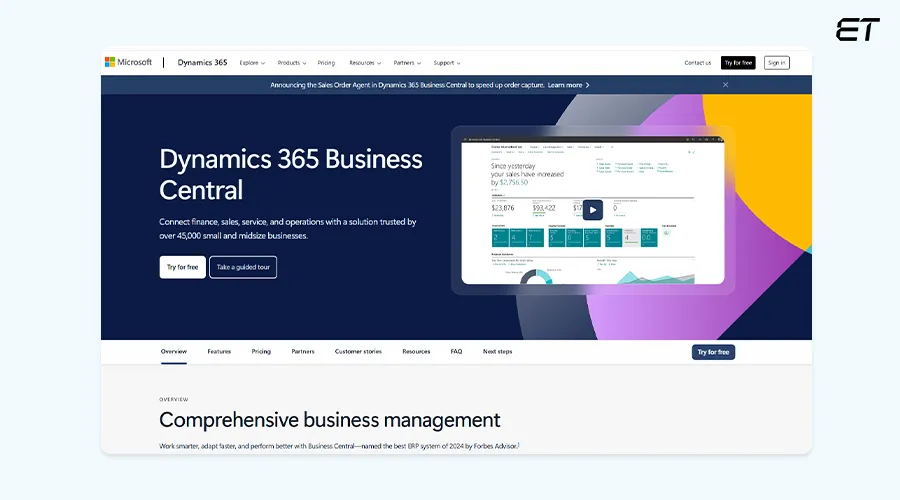
Simply put, Business Central is an ERP (Enterprise Resource Planning) software. It is:
- Cloud based
- Suitable for small to mid-sized companies
- Best for financial management, inventory, and project accounting
- Compatible with MS 365 tools
Note that MS 365 Business Central is an all-in-one platform. You can deploy it fast and go live in weeks. But is it totally cloud-based?
No. If you want an on-premise installation, it’s entirely possible. One of the best things about this ERP is that it can support around 500 users. Handy, right? It’s also affordable (starting from USD 8) with a free 30-day trial.
The Key Features of Business Central
| Financial Management | Reporting and Analytics |
| Project Accounting | Microsoft 365 Integration |
| Sales and Purchase Management | Inventory Management |
What is Microsoft Dynamics 365?
This popular product from Microsoft is a suite of ERP and CRM (Customer Relationship Management) tools.
It covers:
- Sales and customer service
- Finance and operations
- Human resources
- Supply chain management
Dynamics 365 is a good choice for medium to large-scale enterprises. So, if you’re global, investing in this platform is a good option. You can even leverage the AI insights and automation to make precise decisions.
Regarding pricing, Dynamics 365 isn’t as straightforward as Business Central. You need to choose a module and then subscribe to it. Here’s a breakdown for you:
| D365 Module | Pricing Starts From (per month) |
| Business Central | USD 8 |
| Sales | USD 65 |
| Customer Insights | USD 1,000 |
| Customer Service | USD 50 |
| Contact Center | USD 110 |
| Field Service | USD 50 |
| Supply Chain Management | USD 210 |
| Finance | USD 210 |
| Project Operations | USD 135 |
| Human Resources | USD 4 |
| Commerce | USD 210 |
The Business Central vs Dynamics comparison is vital to understand this:
- Business Central is a stand-alone ERP under the D365 brand
- Dynamics 365 is a suite of different applications covering ERP and CRM functions
Let us put it this way. Business Central is like Amazon Prime Video (one platform with the essentials). On the other hand, Microsoft Dynamics 365 is like a Cable TV Package (choose your channels and pay separately for each).
The Salient Features of MS Dynamics 365
| Customer Relationship Management | Reporting and Analytics |
| AI-Driven Insights | Microsoft 365 Integration |
| Supply Chain Management | Inventory Management |
Unlock rental profits with D365. Texas success story inside. Don’t miss out!
Business Central vs Dynamics 365: Your No-Fluff Framework Comparison
Let’s get down to business. Below are the main points defining the Microsoft Dynamics 365 vs Business Central face-off.
1. Deployment Speed
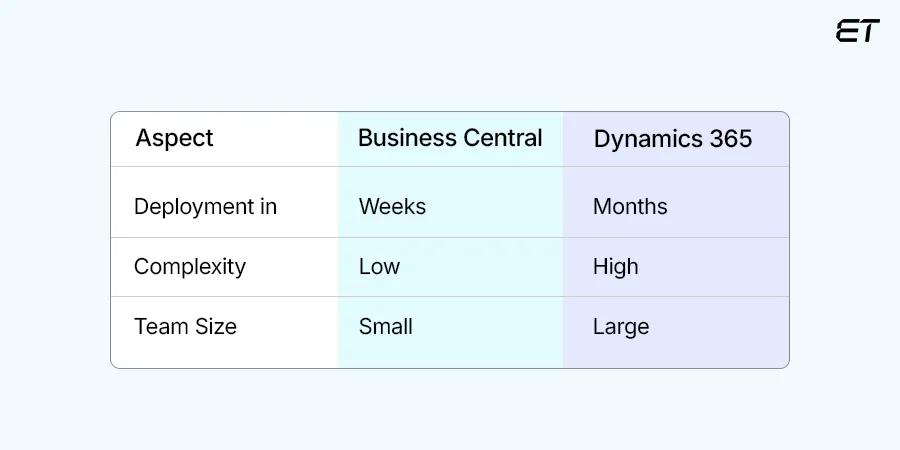
Get this:
- Business Central is ideal if you want fast deployment. So, it’s great if you’re an SMB.
- Microsoft Dynamics 365 needs a phased and planned rollout. It’s great if you need high customization and scalability.
So, there’s no clear winner in this Business Central vs Dynamics 365 point. If you want speed, choose the former. Need to scale? Choose D365.
2. Pricing and Licensing Flexibility
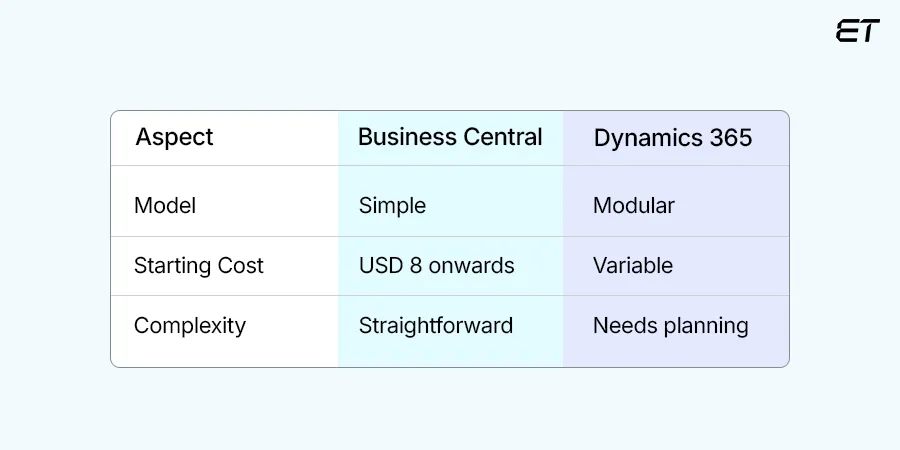
Here’s the deal in this Dynamics 365 vs Business Central distinction:
- The pricing of Business Central is simple to understand. If you’re team is small and you’re on a tight budget, go for it.
- In the case of MS Dynamics 365, you get granular flexibility. So, you’ll need expert guidance for cost optimization.
So, is there a winner in this aspect? Yes. Business Central is simple and less expensive than D365.
3. Use Cases and Business Scope
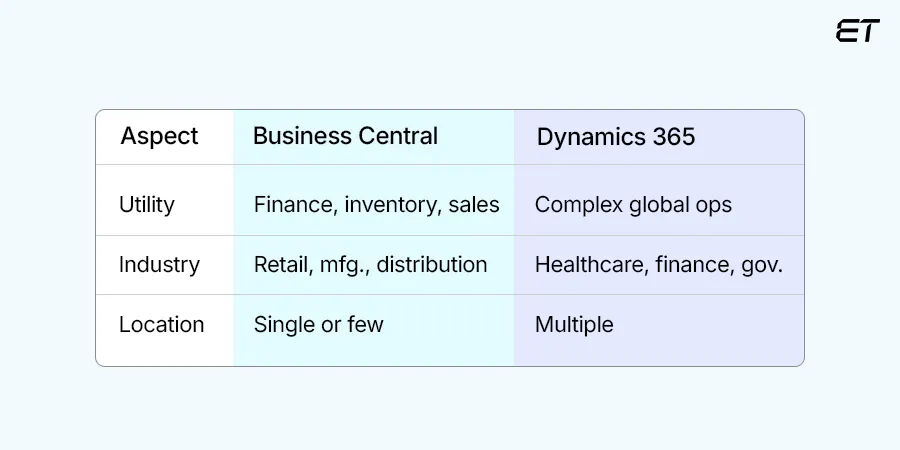
Take a quick note of the following points:
- Business Central covers core ERP – finance, sales, inventory, and project accounting. It doesn’t cover advanced CRM, customer service, and complex manufacturing.
- MS Dynamics 365 has dedicated sales, talent management modules, and more. So, it’s useful for large journeys.
In this Business Central vs Dynamics 365 comparison, there’s no clear winner. D365 is suitable for expansive enterprise needs. But, if your focus is only on ERP, Business Central is a good choice.
4. Integration and Ecosystem

Consider the following points to differentiate Microsoft Dynamics 365 vs Business Central:
- You want seamless use of the main MS 365 apps? Choose Business Central.
- Your company runs on multiple business apps and platforms? Dynamics 365 is your best bet.
Overall, MS D365 wins because of its integration depth and extensibility. It can handle complex requirements fluently.
Want apps that fit your business like a glove? Discover Power Apps.
5. UX and Accessibility
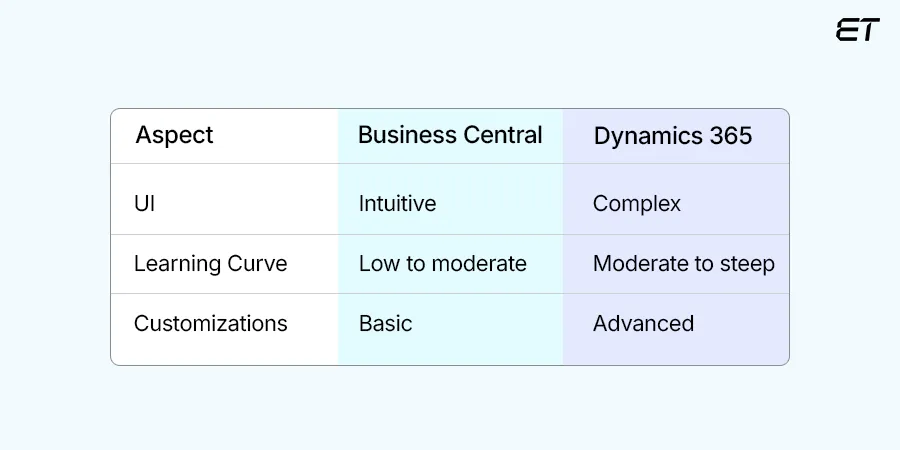
One is like a smartphone, whereas the other is like a DSLR. Here’s what you need to know:
-
- Business Central shines due to its clean and familiar interface.
-
- Dynamics 365 has a powerful UI with various features and multiple apps that can overwhelm you.
Verdict on this Business Central vs Dynamics 365 point? The former wins because of simplicity. Still, if you want feature-rich experiences, D365 is a good option.
6. Security and Compliance
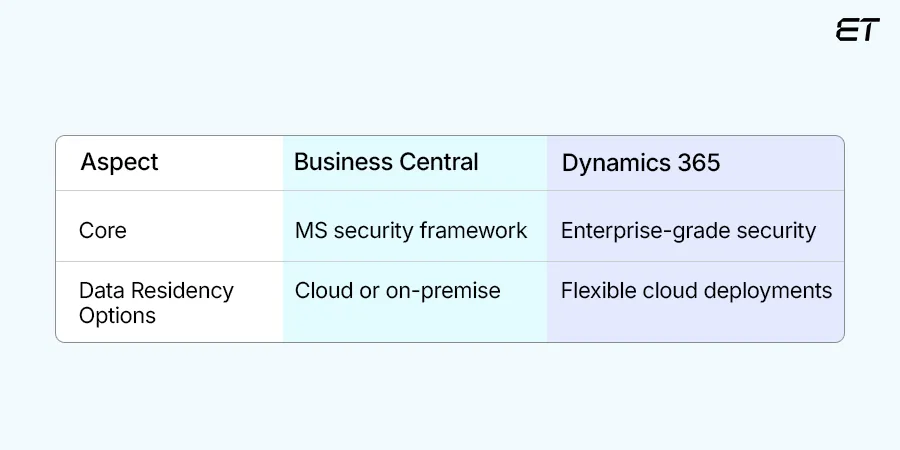
Let’s decode which platform suits your security needs:
- If you’re an SMB, Business Central can be sufficient. It runs on Microsoft’s secure cloud infrastructure.
- MS Dynamics 365 offers advanced threat protection and multi-layered compliance. It’s a good option for large enterprises.
In this Business Central vs Dynamics 365 comparison, D365 holds the edge due to robust security features.
7. Reporting and Analytics

The next point in our Microsoft Business Central vs Dynamics 365 comparison sheds light on the following info:
- If you want clear financial and operational insights, Business Central can prove more than handy.
- Due to the integration with Power BI and AI tools, Dynamics 365 can help in complex decision-making.
So, if we focus on the capabilities, Dynamics 365 has a clear edge. Business Central is suitable for straightforward reporting.
8. Support and Community
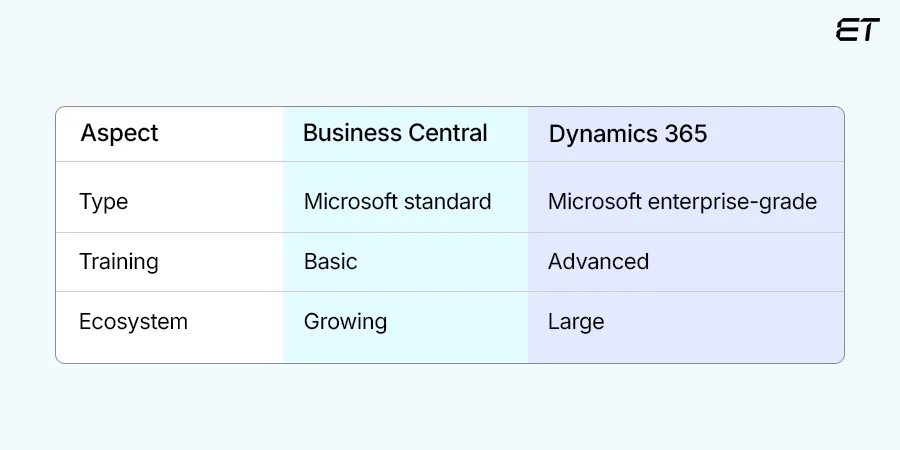
Here’s a quick look at the nuances of the two ERP platforms:
- The active SMB community and standard Microsoft support powers Business Central.
- Dynamics 365 has rapid response SLAs (Service Level Agreements) and a global ecosystem of partners.
So, the verdict of this Business Central vs Dynamics 365 comparison is simple. There’s no clear winner here. For SMBs, the standard support of Business Central is sufficient. But if you’re an enterprise, opt for D365.
Looking to scale fast with expert IT support? See how outsourcing powers growth.
How Do Business Central and Dynamics 365 Work Together?
You want to know the truth after reading the Business Central vs Dynamics 365 comparison?
Both platforms aren’t a single seamless product. However, you can utilize them in various ways. Here are a few:
- Your organization has layers: If you run finance and supply chain operations, D365 can handle resource-heavy tasks. Business Central can take care of your subsidiary units with light ERP needs.
- Different departments use distinct tools: You can streamline workflows using both platforms. Connect the two to prevent delays, rework, and double entry.
- When you need solid dashboards: Both platforms can feed Power BI. As a result, your board of directors can get a unified view in real time.
As you can see, integrating the two Microsoft platforms isn’t quite straightforward. So, to get the best output, better keep them separate.
Endnotes
The Business Central vs Dynamics 365 comparison comes down to clarity and your needs. If you’re an SMB that wants fast deployment, affordability, and core ERP functions, choose Business Central.
On the other hand, choose MS Dynamics 365 if you’re a large enterprise that wants features and scalability. Identify your needs before finalizing a platform if you’re a decision-maker. Focus on operational value and choose a reliable partner who understands your needs.
Ready to stop guessing and start winning? Let’s build your perfect ERP solution.
Frequently Asked Questions
1. Is Microsoft 365 the same as MS Dynamics 365 Business Central?
No. Microsoft 365 is a set of tools like Excel, Word, Outlook, and others. Business Central is an ERP platform focusing on finance, operations, and inventory.
2. Which product should I choose between Dynamics 365 vs Business Central?
If you’re a small or mid-sized company, choose Business Central. On the other hand, if you’re a large enterprise, choose MS Dynamics 365 and the subsequent modules.
3. Why is Dynamics 365 expensive?
D365 offers dedicated modules and has advanced capabilities. You can use AI, automation, and various customizations as required. So, the cost justifies the enterprise-grade tools under Microsoft Dynamics 365.




